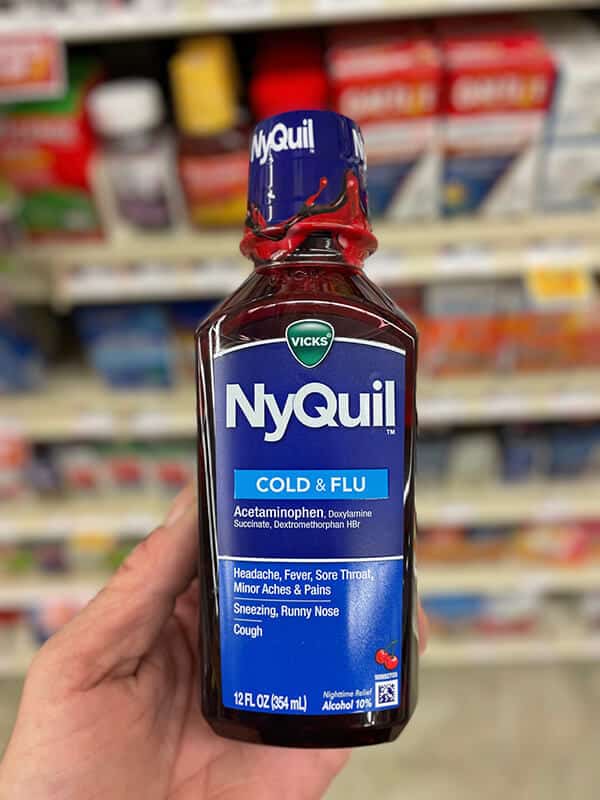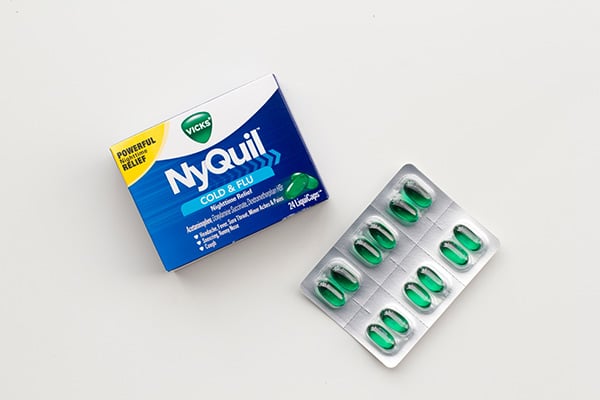Do you find yourself taking NyQuil every night just to fall asleep? You’re not alone. Millions of Americans rely on over-the-counter sleep aids, though few realize the risks hidden behind the label.
Despite affecting one in five people, chronic sleep disturbances remain one of the most overlooked health concerns. So, it should come as no surprise that long-term NyQuil use and other over-the-counter (OTC) sleep aids are a big business in the U.S., where it’s estimated that consumers spent more than $425 million on melatonin supplements in 2018 alone.
Many assume that because sleep aids like Nyquil, Unisom and others are offered without a prescription, they are safe for regular use. However, long-term use of certain OTC sleep medicines can lead to potentially serious health problems.
What’s in popular OTC sleep formulations?
When you look for an over-the-counter sleep aid, you’re confronted with a number of options. Most often, people turn to low-cost sleep aids that contain antihistamines as their primary active ingredient, including big brand names such as Unisom, NyQuil, Tylenol PM, and others.
How Antihistamine-Based Sleep Aids Work
Antihistamines are designed to block histamine, a chemical that plays a role in allergy symptoms. However, histamine also regulates wakefulness in the brain, which is why these medications cause sedation. This effect makes them a common ingredient in OTC sleep aids and nighttime cold medicines.
Although they may seem like a harmless sleep solution, long-term use of NyQuil and other OTC drugs containing diphenhydramine, doxylamine, and other first-generation antihistamines can pose serious health risks.
What Are The Risks of Long-Term Use of Antihistamines for Sleep?
Increased Risk of Cognitive Decline & Dementia
Both diphenhydramine and doxylamine are anticholinergic drugs, meaning they block acetylcholine, a neurotransmitter essential for learning, memory, and attention.
- Research has shown that long-term use of anticholinergic medications is linked to cognitive decline and an increased risk of dementia.
- A 2015 study published in JAMA Internal Medicine found that older adults who regularly took diphenhydramine, doxylamine, or similar drugs had a significantly higher risk of developing Alzheimer’s disease and other forms of dementia.
- Doxylamine may be even more sedating than diphenhydramine, which means it has a stronger effect on cognitive function.

Dependence & Rebound Insomnia
- While antihistamine sleep aids are not considered physically addictive, frequent use can lead to tolerance, meaning you may need higher doses over time to get the same sedative effect.
- When you stop taking them, you may experience rebound insomnia, making it even harder to sleep without the medication.
Next-Day Drowsiness & Impaired Function
- Doxylamine and diphenhydramine have long half-lives, meaning they stay in your system for hours after you wake up. This can lead to:
- Grogginess and delayed reaction times
- Increased fall risk, especially in older adults
- Impaired memory and concentration throughout the day
Are Over-the-Counter (OTC) Sleep Medication Addictive?
While antihistamines are not considered highly addictive, they can lead to psychological dependence. People who frequently use these medications may struggle to fall asleep without them and may experience withdrawal-like symptoms, including: increased anxiety, restlessness, mood swings, and insomnia. Chronic use may also contribute to mental dependence, where individuals believe they can’t sleep without medication, making it harder to develop healthy sleep habits.
Many people turn to multi-symptom cold and flu medications like NyQuil to help them sleep, not realizing these products contain additional active ingredients that carry their own risks.

The Risks of Combination Medications Like NyQuil & Robitussin
Acetaminophen & Liver Damage
NyQuil contains acetaminophen, a pain reliever that can cause severe liver damage in high doses or when combined with alcohol. Acetaminophen overdose is one of the leading causes of acute liver failure in the U.S.
Dextromethorphan & Mental Health Effects
Many nighttime cold medications also contain dextromethorphan (DXM), a cough suppressant that can cause hallucinations, paranoia, and toxic psychosis when taken in high doses. Some individuals abuse DXM recreationally, which can lead to serious physical and mental health effects.
Safer OTC Alternatives to Antihistamine Sleep Aids
If you’re looking for over-the-counter sleep aids that don’t contain antihistamines, several options may help improve sleep without the same cognitive risks.
Melatonin – Melatonin is a hormone that regulates the sleep-wake cycle. Unlike antihistamines, melatonin doesn’t force drowsiness but instead signals the body that it’s time to sleep.
Best for: Jet lag, shift work, or trouble falling asleep
Considerations: Taking too much may disrupt natural melatonin production
Valerian Root – An herbal supplement derived from the valerian plant, valerian root contains compounds that interact with GABA receptors, helping to calm the nervous system and promote sleep.
Best for: Mild insomnia, anxiety-related sleep issues
Considerations: Effects may take time to build up in the body
Magnesium – This essential mineral plays a role in relaxation and regulating neurotransmitters involved in sleep. Magnesium supplements may help if deficiency is contributing to sleep disturbances.
Best for: Muscle relaxation, stress-related insomnia
Considerations: High doses can cause digestive discomfort
L-Theanine – An amino acid found in green tea, L-theanine promotes relaxation without sedation, making it useful for reducing stress and improving sleep quality.
Best for: Stress-related sleep issues
Considerations: More effective when combined with other sleep-promoting strategies
Low-Dose Doxepin (Sleep-Specific Formulations) – Unlike antihistamines, low-dose doxepin (such as Silenor) is a prescription-strength histamine blocker approved for sleep maintenance insomnia. It helps prevent waking up too early while avoiding the risks of traditional antihistamines.
Best for: People who wake up frequently during the night
Considerations: Requires a prescription in higher doses
Other Herbal Options
Several other plant-based supplements may provide mild sleep benefits, including:
- Chamomile – Often used in tea for its calming effects.
- Passionflower – May increase GABA levels, promoting relaxation.
- Glycine – An amino acid that lowers body temperature, helping signal sleep readiness.
Which OTC Sleep Aid is Right for You?
The best option depends on the cause of your sleep issues. Melatonin works well for circadian rhythm disruptions, while valerian and magnesium help with stress-induced insomnia. For chronic sleep problems, lifestyle changes and cognitive-behavioral therapy for insomnia (CBT-I) are more effective than any medication or supplement.
Non-Medication Alternatives for Better Sleep
Instead of relying on medications, consider these natural sleep strategies:
- Stick to a consistent sleep schedule – Go to bed and wake up at the same time every day.
- Create a relaxing bedtime routine – Reading, meditation, or deep breathing can help your brain wind down.
- Optimize your sleep environment – A dark, cool, and quiet bedroom promotes better rest.
- Limit screen time before bed – Blue light from screens can interfere with melatonin production.
- Be mindful of diet and exercise – Avoid caffeine, alcohol, and heavy meals before bed. Regular exercise also promotes better sleep.
The best thing to do is speak to your doctor or a sleep specialist about the problem. Be honest with them and make sure to tell them about medications you have or are currently taking so they can determine if there are any negative interactions taking place.
In a lot of cases, things like behavioral therapy, lifestyle changes, and cutting out substances like caffeine or alcohol are far more effective than medications. These strategies can be used long term and are sure to positively affect your overall health and well-being too.
Get Help for Dependence on OTC Sleep Medications
If you or a loved one finds it difficult to sleep without NyQuil, Unisom, or other over-the-counter sleep aids, you’re not alone. Many people begin using these medications as a short-term solution but struggle to stop—especially as tolerance builds and sleep problems worsen over time.
At Enterhealth, we understand that overcoming dependence on sleep aids requires more than just willpower. Our evidence-based treatment approach goes beyond symptom management to address the underlying causes of sleep disturbances and medication reliance.
A Science-Backed Approach to Lasting Recovery
Unlike traditional rehab programs, Enterhealth offers a comprehensive, medically supervised approach tailored to your unique needs. Our treatment programs combine:
- Expert medical evaluation – Our addiction specialists assess your history, medication use, and sleep patterns to create a personalized treatment plan.
- Safe, medically supervised detox – If necessary, we provide medication-assisted support to manage withdrawal symptoms and help you transition off OTC sleep aids safely.
- Functional psychiatry and sleep therapy – We help address co-occurring sleep disorders, anxiety, and other mental health concerns that contribute to medication dependence.
- Proven behavioral therapies – Cognitive-behavioral therapy for insomnia (CBT-I) is a gold-standard treatment that retrains the brain to restore healthy sleep patterns—without medication.
- Long-term recovery support – From residential treatment at Enterhealth Ranch to flexible outpatient care, we offer ongoing therapy and support to help you sustain lasting change.
If you’re ready to break free from OTC sleep aid dependence, contact us today to learn more about how we can help.




